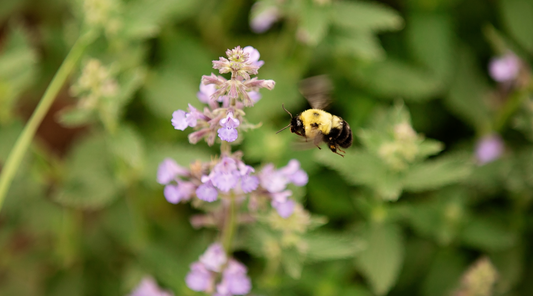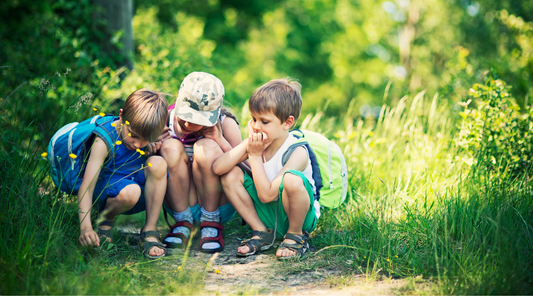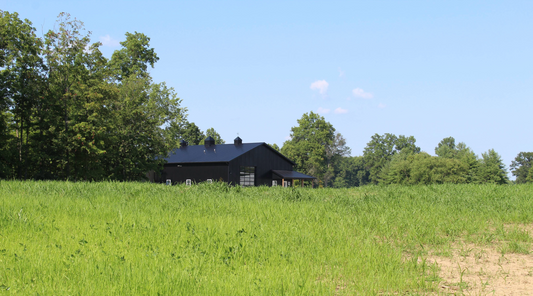
Why More Loveland Parents Are Choosing Nature Based Learning
We had been hiking for hours.
Aria was up ahead on the trail, hopping from rock to rock. Ellie crouched by a mossy log, whispering something to a snail. Theo was barely one at the time, strapped to my back in a carrier, kicking his boots and babbling at every tree we passed.
We were deep in the mountains above Rjukan, Norway. My wife’s home country. The trail ran through birch forests and past waterfalls, following the same route Norwegian commandos once skied to sabotage a Nazi heavy water plant. History underfoot. Mist in the air.

It wasn’t a school day. But in its own way, it kind of was.
Aria is 8 now. She’s always asking questions. Ellie is 5 and spends most of her time building or drawing something. Theo is 2, into everything, and always covered in mud.
They’re the reason Mission Farmstead exists.
That hike stayed with me. Still does. Especially now, as we work on building a different kind of school thousands of miles away near Cincinnati, Ohio.

What is Mission Farmstead's Farm School for Homeschool Kids?
I'm building a farm school for homeschool kids right here in Goshen, Ohio. A place where kids grow in wisdom. It’s not just about what they learn, but how…and why. Where they learn to read the land, care for animals, build things, ask better questions, and live their own hero’s journey.
The barndo is finished. The school inside it is coming to life.
More and more parents I talk to in Loveland are looking for something different. Something rooted. Something real.
What is Nature Based Learning?

Most of us grew up in classrooms with walls and bells. Nature based learning is something else. It doesn’t mean sitting in mud all day. It means learning with nature and seeing it as the teacher.
At our farm school, kids will journal under trees. Turn compost. Plant seeds. Build fences. Ask questions about clouds. Solve real problems in the garden.
Eventually, they’ll feed chickens, tend to cows, and watch a pasture regenerate. These things are coming. And they’ll matter, because learning isn’t just about ideas. It’s about experience.
This is experiential learning. Education that sticks because it’s lived. When they read about ecosystems, they’ll think about the compost pile out back. When they study math, they’ll remember building raised beds and calculating how much seed to plant. When they talk about energy, they’ll feel it in their own hands.

It’s hands on education that means something.
And because every day is spent outside, it’s also outdoor learning in its truest form. Sun, wind, dirt, and all. Some families I’ve shared this vision with have called it a nature school or a forest school. They’re not wrong. It’s a school rooted in the land.
Why Are Families Turning to Nature Based Education?

Because something in them is stirring. They’re seeing their kids come home tired, not from a good day’s work, but from sitting still too long. Curiosity slips. Sometimes, it never even gets the chance to take root.
Nature based education gives space for kids to be who they are.
Aria follows tracks into science. Ellie turns forest findings into art. Theo is still small, but he watches everything—mud, bugs, clouds, boots—and somehow makes sense of it all.
They’re learning to think, to care, to listen, to act. That’s values based education.
And it's not just the kids. Parents are waking up to something they forgot they believed. That kids are capable. That school should feel alive. That learning should mean something.
When a child grows their food, they eat differently. When they solve a real problem, they feel it in their spirit. When they sit with peers and talk about what they’ve learned—not what they got wrong—they gain confidence.
Not Just a School
We’re not just opening a school. We’re shaping a way of life.
Kids will grow food. Build things that matter. Reflect at the end of the day. There won’t be test scores. There will be progress. Real, visible growth.
It’s holistic education—head, heart, and hands working together.
They’ll use tools. Write in journals by the firepit. One day, they’ll sit beside chickens and ask chatGPT about something they've been wondering. They’ll fix things. They’ll notice the sky.
Families come here to remember what they forgot they needed.
I hope we leave an impression on each family that leaves here.

Is This Really Alternative Learning?
They call it alternative schooling. But it’s older than most systems we know. It’s how people learned for generations. From the land. From mentors. From work worth doing.
I'm not building this to fight school. I'm building it to reimagine it.
What if a child left their education journey knowing who they are? Where they belong? What they can do?
What if they felt safe enough to fail? Brave enough to try again? And grounded enough to stand on their own two feet?
That’s what I'm after.
One feather. One compost pile. One question at a time.
If you're curious what nature based learning might look like for your family, click here to learn more.



